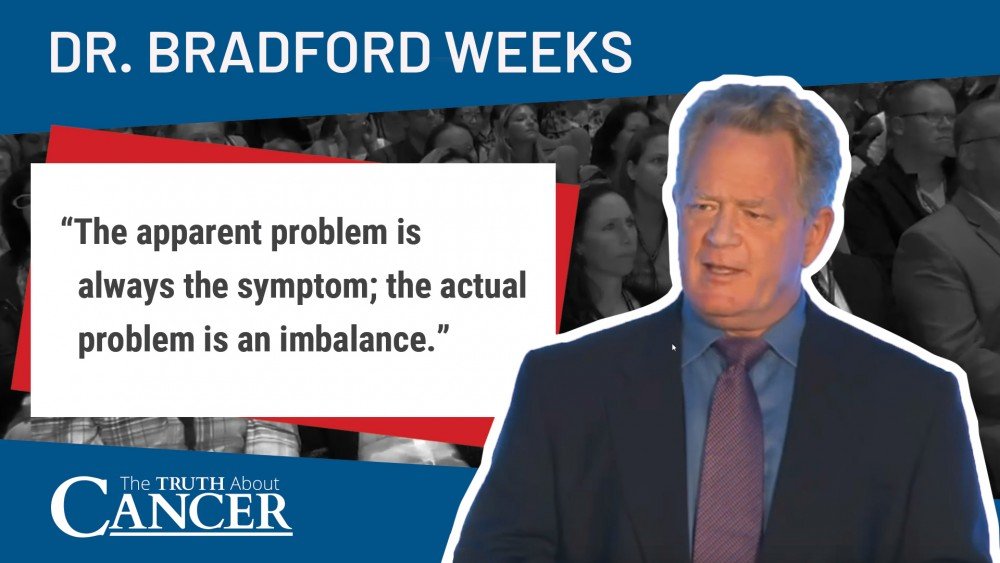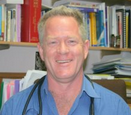Video Transcript: Corporate vs. Corrective Medicine: Treatment Beyond Symptoms (Part 1)
Charlene Bollinger: Although Dr. Weeks is one of the select few practitioners qualified to administer chemotherapy, he rarely puts his patients through it. Why? Because he believes in corrective medicine, not corporate medicine.
Ty Bollinger: The future of cancer research is to better understand the root cause, not treating cancer symptoms. It’s just not sustainable for you or your family’s health. Join us at last year’s The Truth About Cancer LIVE Event from Dr. Brad Week’s keynote presentation on corporate vs. corrective medicine… and treating cancer beyond just the symptoms.
Dr. Bradford Weeks: We’re going to talk about the symptom as a healing gesture. And the reason that’s important is that a lot of us here are concerned about cancer and, I have to tell you, the tumor is a symptom; the tumor is not the disease. So, fighting the tumor, cutting the tumor out is really just symptomatic medicine.
We’re going to go through how symptomatic medicine is quite profitable. We call that corporate medicine for profit as opposed to integrative medicine, and we’re going to talk about how one has to listen to the symptoms and to use the symptoms to track down what the real problem is. So, in this short period of time, what I’ll do is I’ll talk about how we have to stop shooting the messenger.
We have to talk about how we use the symptoms to find the cause and how to correct those imbalances. So, what I’ve been doing for the past 25 years is called corrective medicine. What’s out of balance? Let’s restore that. Now I’m also going to talk about corporate medicine, because for the last 25 years we’ve all been struggling. What do you call one of these funny doctors who does integrative medicine? Is it alternative, is it holistic?
I just call it now corrective medicine, and I distinguish that doctor from the doctors who are doing corporate medicine for profit. If your doctor is being paid by a third party, typically he or she is working for the insurance company, but working on you. You need to be able to hold your doctor accountable and in corporate medicine that’s hard. In integrative medicine, with corrective medicine, that’s easy.
So, we’re going to talk about symptoms and how to pay attention to those and how you can be blessed by the symptom. And we’re going to talk about corporate medicine versus integrative medicine, and we’re going to talk about the tools you have to help yourself. How to become an empowered consumer. It’s not that difficult, we just have to be educated, which is where the term doctor comes from. Doctor from docere to lead or to teach. And I’m going to talk about seed nutrition because seeds are very important.
Typically, I talk about cancer stem cells, and if you’re not familiar with that I’m going to give you a slide where you can do some reading. But the cancer stem cell is the real target, not the cancer tumor cell. So even though I’m one of the trainers in insulin potentiated chemotherapy, I rarely recommend it anymore. Because chemotherapy you’ll see makes your cancer more virulent and more aggressive. Chemotherapy and radiation are symptomatic medicine, quite profitable, [and] not good for you.
All right, so what upsets patients in general? It’s the symptom. We can’t ignore the symptom. If you have a headache, please get rid of that headache, but be aware that it might be telling you that there’s a brain tumor. We see that a lot. People ignore headaches, it turns out, especially with cellphone use now, there’s a concern it might be a tumor. So, the apparent problem is always the symptom, the actual problem is an imbalance, and the challenge is whereas corporate medicine makes trillions of dollars doing symptomatic medicine. In fact, if you just regenerate and correct the imbalances you’ll do much better.
One of my favorite quotes is Thomas Pynchon in Gravity’s Rainbow. He says, “If you can get people to ask the wrong question, the answer doesn’t matter.”
The wrong question is “how do you kill the cancer tumor?” The right question is “how do you remedy the cancer stem cell?” Now it’s the same thing with illnesses in general. All symptoms: headaches, hypoglycemia, gastritis, you name it, high cholesterol. I’m going to go through these relatively quickly. All these symptoms are actually healing gestures, they’re here to give you a message.
Now, let’s assume you’re sitting here with a pain in your butt. If you were a conventional corporate doctor, if I were that, I would give you a pain medication, and if that didn’t work I’d give you more pain medication. If that didn’t work I’d refer you to a psychiatrist, right? And if that didn’t work, after a while you’d be addicted to the medications and we’d send you to rehab. But the corporate medical doctor would never say “Are you sitting on a tack?”
Now that’s kind of a metaphor, but if you were why not just do the corrective medicine approach? Why not, if it’s humanely possible, delay the medication and assess the environmental impacts, and then if there’s a tack there, teach you about tacks in general, how to avoid them and so forth. Now, symptomatically we do suffer. On the road of life we have breakdowns. What are our best options when we have a breakdown of some type of symptomatic problem? Well you can call a tow truck or you can fix the problem.
Ty Bollinger: We hope you learned a lot from this video. If you did learn something new, please take a few seconds to let us know in the comment section below.



















Yes great info
Delivered in easy to understand language. The message that chemo and radiation treatment do not cure the problem, but merely mask the symptoms comes through loud and clear. I am a little disturbed to hear that chemo and radiation actually make the cancer worse.
28 years ago I was diagnosed with prostate cancer. Natural means stopped it and it has been gone after following a Naturapath’s book. Didn’t like the urologist’s option to cut it out. Let nature heal is my motto